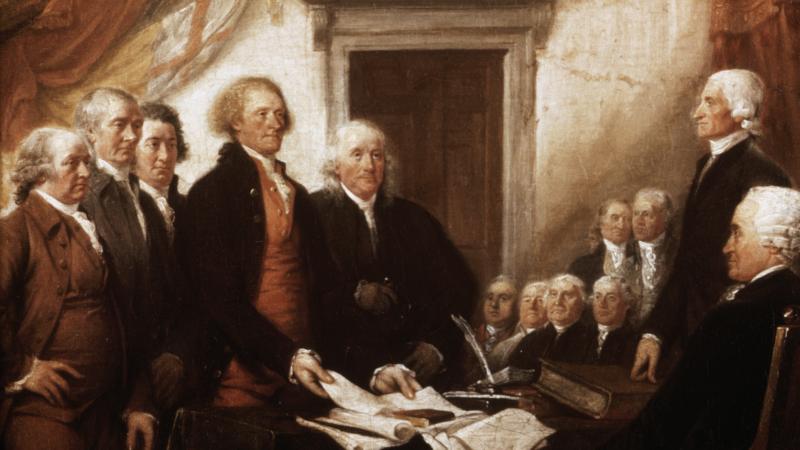Conservative filmmaker Dinesh D’Souza backs Michael Moore in censorship battle with YouTube
Director of Moore-produced film attacked by environmentalists accuses Yahoo of 'blatant act of censorship' and 'misuse of copyright law' in yanking 'Planet of the Humans' from platform. Yahoo says it's legally bound to remove content challenged by valid legal notification of copyright violation.
Michael Moore has some unlikely allies in his fight with YouTube. Conservatives.
The Oscar-winning filmmaker debuted his newest project, “Planet of the Humans,” on his Rumble Media YouTube channel April 21. The documentary, produced and promoted by Moore and directed by Jeff Gibbs, slams core elements of the modern green movement, Al Gore, and other eco-sacred cows.
“Planet’s” liberal critics, including climate scientist Michael Mann and “Gasland” filmmaker Josh Fox, demanded YouTube remove the film in an op-ep published in The Nation. Critics cited what they call serial inaccuracies that harm the renewable energy movement and efforts to counter climate change.
YouTube held firm, for a while, as “Planet” racked up 8.3 million views. Then photographer Toby Smith filed a copyright infringement complaint over “Planet” to YouTube, noting the film used several seconds of a video he created. The platform yanked the feature May 25.
"When we receive a valid legal notification regarding content that allegedly violates copyright, we are required by law to remove it," a YouTube spokesperson told Fox News. "YouTube is not in a position to mediate copyright disputes — it is between the parties involved. If an uploader feels that their content is covered by a fair-use exception, they can file a counter notification.”
The film's director isn't buying YouTube's explanation. "This attempt to take down my film and prevent the public from seeing it is a blatant act of censorship by political critics of my movie,” Gibbs said in a statement provided to Deadline. "It is a misuse of copyright law to shutdown a film that has opened a serious conversation about how parts of the environmental movement have gotten into bed with Wall Street and so-called 'green capitalists.' There is absolutely no copyright violation in my film. This is just another attempt by the film’s opponents to subvert the right to free speech."
Gibbs called YouTube’s actions “Trumpian” in a separate statement.
The PR team behind “Planet of the Humans” did not respond to an interview request to speak with either Moore or Gibbs.
However, conservative author and filmmaker Dinesh D’Souza, of all people, has Moore’s back, at least when it comes to making “Planet” available to all.
“I think digital censorship is bad across the board,” says D’Souza, adding copyright issues can be legitimate in some cases. “He’s upset some people, and they want to shut him up.”
D’Souza says he came of age when “civil liberties organizations would go to bat for even the most outrageously hateful points of view,” like the neo-Nazis who marched on Skokie, Ill. in 1978.
“You have to protect the right [to free speech], even at its outer limits,” says D’Souza, whose upcoming documentary, “Trump Card,” excoriates the Democrats’ socialist shift and the “Deep State.”
PEN America’s Summer Lopez, senior director of free expression programs, said in a statement “Planet’s” removal “raises concerns that those who disagree with the film may be attempting to keep it from public view … the public has a fundamental right to view this film, to hear all sides of the debate, and to come to their own conclusions.”
“Planet of the Humans” also got removed from Films for Action platform, but based solely on content concerns.
This isn’t the only time copyright woes threatened a feature film. In 2008 ex-Beatle John Lennon’s sons and widow, Yoko Ono, battled the team behind “Expelled: No Intelligence Allowed” for its use of Lennon’s song “Imagine” without seeking permission. That documentary argued on behalf of Intelligent Design.
Marc Morano, publisher of Climate Depot and the driving force behind the upcoming “Climate Hustle 2,” says the only surprise in the Moore vs. YouTube fight is that it took so long to yank the film down.
“YouTube has a long history of only toeing the government-approved views on climate and green energy,” Morano says.
The roiling debate over social media platforms tagging or eliminating content, which went all the way to the White House this week via President Donald Trump’s Twitter war, complicates the story.
“On one hand, YouTube, Facebook and Twitter theoretically can censor any content it wishes,” Morano says. “And on the other hand, the big social media outlets are operating as a monopoly, crushing dissent and wielding their bias as they see fit.”
Morano and Moore would struggle to find a single item to agree on over climate change, but the former isn’t eager to silence the filmmaker.
“I fully support the free and open exchange of ideas in public debate, so I fully support Moore's right to be seen and heard,” he says. “Climate skeptics have seen the suppression of debate for decades, and the last thing we wanted to see was Moore get silenced.”
Phelim McAleer knows what it’s like to have his work challenged on copyright grounds. The right-leaning artist behind the recent “FBI Lovebirds: Undercovers” play, satirizing former FBI agents Peter Strzok and Lisa Page, says Fox lobbed a copyright infringement claim against him when he questioned a key scene in “Gasland.”
The filmmaker and playwright sees Moore’s battle as less about free speech and more about speech control.
“This is about the left gaming the rules … to close down opinions they don’t like rather than argue with them,” McAleer says. He’d rather critics create their own video rebuttals rather than taking content down.
Conservatives have been the most vocal in alleging Big Tech censorship, but McAleer doesn’t think this experience will attract more progressives to the cause.
“No, liberals now seem to be happy with censorship because the censorship is now targeting conservatives,” he says.
D’Souza gently disagrees, saying the Moore-YouTube battle could alert some on the left about the issue.
“It’s certainly useful when everyone feels that It could be them [next],” D’Souza says. “As long as the left feels that the big guns are trained only on the other side they might be willing to look the other way.”
















